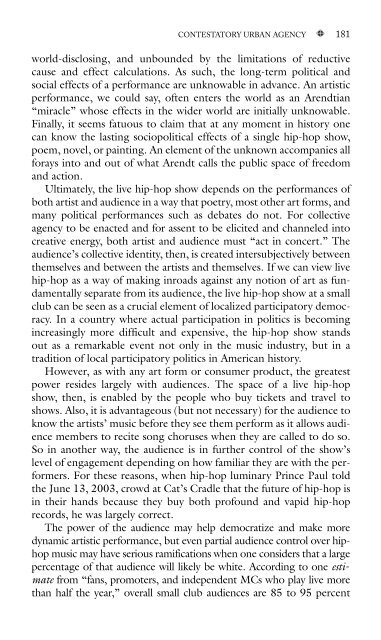american political poetry in the 21st century - STIBA Malang
american political poetry in the 21st century - STIBA Malang
american political poetry in the 21st century - STIBA Malang
Create successful ePaper yourself
Turn your PDF publications into a flip-book with our unique Google optimized e-Paper software.
CONTESTATORY URBAN AGENCY 181<br />
world-disclos<strong>in</strong>g, and unbounded by <strong>the</strong> limitations of reductive<br />
cause and effect calculations. As such, <strong>the</strong> long-term <strong>political</strong> and<br />
social effects of a performance are unknowable <strong>in</strong> advance. An artistic<br />
performance, we could say, often enters <strong>the</strong> world as an Arendtian<br />
“miracle” whose effects <strong>in</strong> <strong>the</strong> wider world are <strong>in</strong>itially unknowable.<br />
F<strong>in</strong>ally, it seems fatuous to claim that at any moment <strong>in</strong> history one<br />
can know <strong>the</strong> last<strong>in</strong>g socio<strong>political</strong> effects of a s<strong>in</strong>gle hip-hop show,<br />
poem, novel, or pa<strong>in</strong>t<strong>in</strong>g. An element of <strong>the</strong> unknown accompanies all<br />
forays <strong>in</strong>to and out of what Arendt calls <strong>the</strong> public space of freedom<br />
and action.<br />
Ultimately, <strong>the</strong> live hip-hop show depends on <strong>the</strong> performances of<br />
both artist and audience <strong>in</strong> a way that <strong>poetry</strong>, most o<strong>the</strong>r art forms, and<br />
many <strong>political</strong> performances such as debates do not. For collective<br />
agency to be enacted and for assent to be elicited and channeled <strong>in</strong>to<br />
creative energy, both artist and audience must “act <strong>in</strong> concert.” The<br />
audience’s collective identity, <strong>the</strong>n, is created <strong>in</strong>tersubjectively between<br />
<strong>the</strong>mselves and between <strong>the</strong> artists and <strong>the</strong>mselves. If we can view live<br />
hip-hop as a way of mak<strong>in</strong>g <strong>in</strong>roads aga<strong>in</strong>st any notion of art as fundamentally<br />
separate from its audience, <strong>the</strong> live hip-hop show at a small<br />
club can be seen as a crucial element of localized participatory democracy.<br />
In a country where actual participation <strong>in</strong> politics is becom<strong>in</strong>g<br />
<strong>in</strong>creas<strong>in</strong>gly more difficult and expensive, <strong>the</strong> hip-hop show stands<br />
out as a remarkable event not only <strong>in</strong> <strong>the</strong> music <strong>in</strong>dustry, but <strong>in</strong> a<br />
tradition of local participatory politics <strong>in</strong> American history.<br />
However, as with any art form or consumer product, <strong>the</strong> greatest<br />
power resides largely with audiences. The space of a live hip-hop<br />
show, <strong>the</strong>n, is enabled by <strong>the</strong> people who buy tickets and travel to<br />
shows. Also, it is advantageous (but not necessary) for <strong>the</strong> audience to<br />
know <strong>the</strong> artists’ music before <strong>the</strong>y see <strong>the</strong>m perform as it allows audience<br />
members to recite song choruses when <strong>the</strong>y are called to do so.<br />
So <strong>in</strong> ano<strong>the</strong>r way, <strong>the</strong> audience is <strong>in</strong> fur<strong>the</strong>r control of <strong>the</strong> show’s<br />
level of engagement depend<strong>in</strong>g on how familiar <strong>the</strong>y are with <strong>the</strong> performers.<br />
For <strong>the</strong>se reasons, when hip-hop lum<strong>in</strong>ary Pr<strong>in</strong>ce Paul told<br />
<strong>the</strong> June 13, 2003, crowd at Cat’s Cradle that <strong>the</strong> future of hip-hop is<br />
<strong>in</strong> <strong>the</strong>ir hands because <strong>the</strong>y buy both profound and vapid hip-hop<br />
records, he was largely correct.<br />
The power of <strong>the</strong> audience may help democratize and make more<br />
dynamic artistic performance, but even partial audience control over hiphop<br />
music may have serious ramifications when one considers that a large<br />
percentage of that audience will likely be white. Accord<strong>in</strong>g to one estimate<br />
from “fans, promoters, and <strong>in</strong>dependent MCs who play live more<br />
than half <strong>the</strong> year,” overall small club audiences are 85 to 95 percent










